Research Round-up – February 2020
Welcome to the latest instalment of our monthly feature series throwing the spotlight on our research success stories.
Egypt's Great Pyramids have played a key part in University research, and a new documentary this month.

The strength of our research is in making a real and telling difference to the world around us, by working across traditional boundaries to find innovative solutions to some of the greatest challenges facing society today.
Here we highlight some of latest projects being pioneered by the expertise and efforts of the highly talented research community at Leeds.
From grant awards to examples of outstanding interdisciplinary work and best practice, we’re keen to showcase your research achievements. See the foot of this article for details of how you can get involved.
Featured in this month’s round-up:
- Launching White Rose Gender Equality College
- £1m UKRI grant drives autonomous transport forward
- Human stem cells and cancer origins discovery
- Inaugural Leeds Early Career Publishing Prize
- Meet the Curators
- Taking the human out of HumanDrive
- Using sound and light for ultra-fast data transfer
- Developing new treatments for heart failure
- The Robot, The Dentist and The Pyramid
- Yorkshire patients needed for irritable bowel syndrome trial
- Research Council visits
- Cancer Research UK Roadshow visits Leeds on World Cancer Day
- Helping a heavy industry reach net-zero
- Data workshop
- How to feature in future round-ups
Launching White Rose Gender Equality College
The White Rose Gender Equality College has been formed to highlight gender equality challenges across the world.
It will provide academic teams with access to expertise and tools to empower positive change within their research.
The College aims to form a strong peer group, where members can share good practice with each other and the wider international development research community. This is to ensure that research meets requirements of the International Gender Equality Act 2014 and also recognises UN Sustainable Development Goal 5 – gender equality and broader equity issues.
The College is formed of members from the universities of Leeds, Sheffield and York, with a variety of backgrounds and expertise in gender equality issues, giving opportunity for collaboration and wider learning.
All Global Challenge Research Fund (GCRF), UKRI and Newton Fund applicants are required to prove they have considered gender equality within their research proposals.
The College is not only for those working on social/community projects but for all researchers working across all disciplines, from engineering to the humanities, health to the physical and social sciences.
As soon as you have an idea for a global development research project, you are welcome to get in touch with the College, which will support your choice of members to engage with. The intention is to integrate and embed expertise throughout the entire project lifecycle from those familiar with gender equality issues.
Claire Pickerden, Collaboration Development Manager with the White Rose University Consortium, said: “There is a wealth of gender expertise across the White Rose universities and this opportunity to positively contribute to GCRF and Newton applications is very welcome.
“This initiative will enable a deeper understanding of how to address inequality in development, whilst contributing to culture change here in the UK academy, too. White Rose looks forward to the success of this pilot and the new networks and collaborative relationships that will be formed.”
Contact Claire Pickerden or Alison Lundbeck for further information if you would like to become a member of the College.
 Concept for future autonomous vehicles
Concept for future autonomous vehicles
£1m UKRI grant drives autonomous transport forward
Professor of Urban Analytics, Ed Manley, has been awarded a UKRI grant worth more than £900,000.
The grant is part of the UK-Canada AI initiative to develop new models of autonomous transport to enhance mobility in ageing populations.
The Responsible Automation for Inclusive Mobility project (RAIM) is one of ten schemes that support the responsible development of artificial intelligence (AI). The project aims to build a better understanding of the opportunities and challenges facing autonomous transport, and build these into novel AI-based methods for estimating future demand and optimising new services.
The UK-Canada AI initiative has brought together a consortium of the University of Leeds, UCL and the University of Manitoba, as well as local transport agencies and passenger advocacy groups.
The project is led by Professor Ed Manley, fromn the School of Geography at Leeds and an affiliate of Leeds Institute for Data Analytics, as well as Dr Babak Mehran, from the University of Manitoba, and additional involvement at Leeds from Professor Susan Grant Muller, of the Institute for Transport Studies.
Professor Manley said: “There is real potential for demand-responsive autonomous transport to have significant benefits for an ageing population that go beyond accessibility alone.
“During this project, we’ll aim to not only improve our understanding of ageing mobility needs but use novel AI-based methods to develop an autonomous vehicle system that fully meets those needs.
“It’ll be great to expand our research to the Canadian setting, which faces similar challenges to the UK, and develop new collaborations with the University of Manitoba.”
The RAIM project will run until 2023.
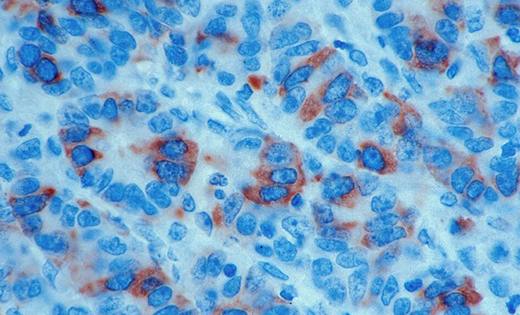 Visualisation of cells in the stomach
Visualisation of cells in the stomach
Human stem cells and cancer origins discovery
For the first time ever, an international team of researchers has identified and isolated the stem cells responsible for renewing stomach tissues.
A newly identified genetic marker – Aquaporin-5 (AQP5) – was key to this landmark finding, which points to new therapeutic opportunities, including the development of regenerative medicine and improved stomach cancer treatments.
Stomach cancer, also known as gastric cancer, is the fifth most common cancer worldwide and the third deadliest. The high incidence rates in Asia have highlighted an unmet need to study the role of stem cells in tissue maintenance and cancer of the stomach. Their findings were published in the journal Nature this month.
Co-author of the paper, Professor Heike I Grabsch, from the Leeds Institute for Medical Research (LIMR), helped to establish the diagnosis of stomach cancer.
She said: “I joined this multidisciplinary international research team at a stage when the ground-breaking results were translated into humans. It was exciting to find that the new AQP5 marker is also present in many of the human stomach cancer samples.
“Our finding offers urgently needed new insights into stomach cancer development and identifies new potential targets for the development of more effective treatment of patients with stomach cancer.”
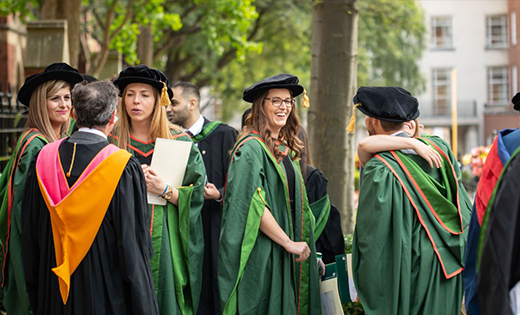 The inaugural prize is open to PhD graduates
The inaugural prize is open to PhD graduates
Inaugural Leeds Early Career Publishing Prize
Have you supervised an outstanding PhD student in the past three years? Could they rewrite their thesis to produce a monograph suitable for open access publishing?
The Leeds Early Career Publishing Prize offers University of Leeds PhD graduates the opportunity to submit a proposal based on their PhD thesis to be considered for publication by White Rose University Press (WRUP).
Prize winners will receive:
- a £250 cash prize
- support through the peer review process; and
- all WRUP Book Processing Charges/OA publishing fees paid for if the title is commissioned.
Applications close on Thursday 30 April to graduates whose PhD was on a pass list in 2017, 2018 or 2019.
Find out more about the prize and how to enter at the Library website.
Taking the human out of HumanDrive
University research has been a driving force in the HumanDrive project.
The research saw an autonomous car drive 230 miles – breaking the record for the UK’s longest and most complex autonomous car journey.
The Grand Drive, as it’s been called, was achieved as part of an investigation into how autonomous driving can emulate a natural, human-like driving style. This consortium project included experts from Leeds and was led by Nissan engineers in the UK.
On its journey, the Nissan LEAF test vehicle experienced a range of driving scenarios, from country lanes with no or minimal road markings, to junctions, roundabouts and motorways. The autonomous technology activated along the route to change lanes, merge and stop and start, when necessary.
Research by the Institute for Transport Studies was critical in the development of natural and human-like control systems to create a comfortable and familiar experience for the user during the Grand Drive.
Professor Natasha Merat was the principal investigator for the project research based at Leeds. Professor Richard Romano oversaw the use of the University’s driving simulator, which is part of Leeds’ Virtuocity centre.
Professor Merat said: “While there are many vehicles around the world that have some self-driving features, such as self-parking or cruise control, integrating human-like controllers in automated vehicles will provide a smoother, more comfortable experience for drivers.”
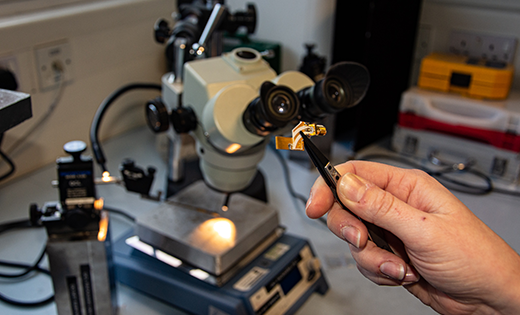 Quantum cascade laser, on its mounting, being held by a set of tweezers
Quantum cascade laser, on its mounting, being held by a set of tweezers
Using sound and light for ultra-fast data transfer
Researchers have made a breakthrough in the control of terahertz quantum cascade lasers that could lead to the transmission of data at the rate of 100 gigabits per second.
That ultra-fast data transfer would be about a thousand times quicker than a typical fast Ethernet operating at 100 megabits a second.
What distinguishes terahertz quantum cascade lasers from other lasers is that they emit light in the terahertz range of the electromagnetic spectrum. They have applications in the field of spectroscopy, where they are used in chemical analysis.
The lasers could also eventually provide ultra-fast, short-hop wireless links, where large datasets have to be transferred across hospital campuses or between research facilities on universities – or in satellite communications.
The research has been led by Professor John Cunningham in the School of Electronic and Electrical Engineering together with academics from the University of Nottingham. The findings have been published in Nature Communications this month.
John said: “This is exciting research. At the moment, the system for modulating a quantum cascade laser is electrically driven – but that system has limitations.”
Developing new treatments for heart failure
A University research project to identify new drug treatments for heart failure has been awarded a grant of almost £150,000 by national charity Heart Research UK.
The project, led by Dr Scott Bowen, from the School of Biomedical Sciences, will investigate the causes of muscle weakness in heart failure, with the aim of identifying new drug treatments for loss of muscle strength to improve quality of life and survival rates in patients.
Heart failure is when the heart fails to pump enough blood around the body effectively. It usually occurs because the heart muscle has become too weak or stiff to work properly.
About a million people in the UK have heart failure and numbers are increasing. Many patients with heart failure have severe muscle weakness but no effective drug treatments are available.
Dr Bowen said: “If successful, this project will help us understand what causes muscle weakness in heart failure and identify new drug treatments for loss of muscle strength.
“It’s an incredibly exciting area of study and one that we hope will soon translate into real patient benefit. We are very grateful to Heart Research UK for allowing us to undertake this vital research.”
Dr Bowen’s team has found that heart failure patients have higher muscle levels of a protein called ‘MuRF1’, which may have an important role in muscle weakness caused by heart failure.
When MuRF1 levels are reduced, for example by exercise, muscle strength and mass improve in heart failure. Many heart failure patients are too ill to perform exercise, so the team has started a new research programme to identify drugs that can block MuRF1. They have identified one novel drug and exciting early findings show this improves muscle strength.
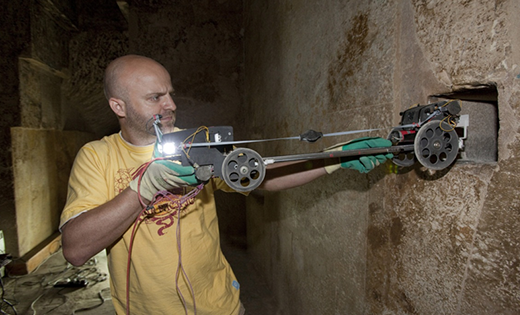 The Djedi robot being placed into the hidden passageway in the Great Pyramid
The Djedi robot being placed into the hidden passageway in the Great Pyramid
The Robot, The Dentist and The Pyramid
Engineers have developed a robot that has successfully navigated one of the narrow shafts of the Great Pyramid in an attempt to solve one of the big mysteries in Egyptian archaeology.
Their story is featured in a documentary just released on the Ancient Architects YouTube channel.
The Robot, The Dentist and The Pyramid follows a group of research engineers and scientists – some from Leeds – who accepted a challenge to build a robot capable of exploring the pyramid.
Various archaeological teams have explored the pyramid, reaching what is known as the Queen’s Chamber. Archaeological digs found a narrow shaft hidden behind a false wall that climbed at a 40-degree angle up into the pyramid.
But those explorations had resulted in damage to the shaft and no one had explored where it led.
Rob Richardson, Professor of Robotics at Leeds, was the technical lead of the Djedi expedition in 2010. He and a small group of colleagues had accepted a challenge thrown down by Hong Kong dentist and inventor, Dr Tze Chuen Ng, to design and build a robot that could reach the end of the shaft and find what, if anything, was there.
Yorkshire patients needed for irritable bowel syndrome trial
Patients in GP surgeries across West Yorkshire are being invited to take part in a large trial of low-dose amitriptyline for irritable bowel syndrome (IBS).
Researchers from the Universities of Leeds, Southampton and Bristol are coordinating the trial, which is now open for recruitment.
Irritable bowel syndrome is a common gut disorder affecting one in 10 people. Abdominal pain, bloating and altered bowel habit affect patients’ quality of life substantially, and can force them to take days off work.
Low-dose amitriptyline is recommended as a treatment option for people who have persistent, troublesome IBS symptoms. It is thought to work at low doses in IBS because it has pain-relieving properties and changes bowel activity. However, there have been no large studies done in primary care to test whether or not it works.
This study, known as ATLANTIS (Amitriptyline at low-dose and titrated for IBS as second-line treatment) is funded by the National Institute for Health Research (NIHR) Health Technology Assessment programme, and will recruit more than 500 people with IBS, who will receive either amitriptyline or a placebo tablet for at least six months.
Participants will be recruited from general practices across three hubs within Yorkshire, the South and South West of England.
Visit the ATLANTIS website for further information about joining the trial.
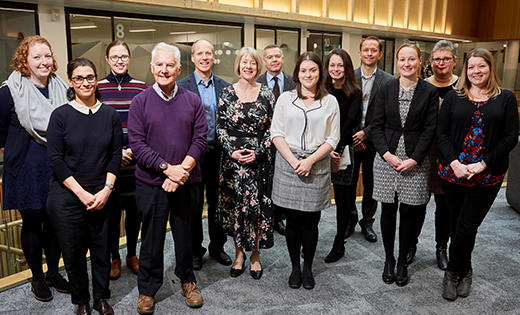 EPSRC delegation with University stakeholders
EPSRC delegation with University stakeholders
Research Council visits
This month saw visits to campus from senior members from two of UKRI’s research councils.
Medical Research Council (MRC)
Senior leaders from MRC found out more about the breadth of health research taking place on campus.
During the visit, Steve Oakeshott, Head of Innovative Technologies, and Steve Meader, Programme Manager for Neurological Disorders, from the MRC, met researchers who are working across disciplines to tackle major health burdens.
These include:
- using surgical technologies to address and improve minimally invasive surgery, cardiac assistance and orthotics
- applying artificial intelligence to cancer diagnosis
- using fluid dynamics to analyse disease mechanisms; and
- Astbury Centre researchers who are looking to develop a cheaper and safer way of making the polio vaccine.
Steve Oakeshott said: “It is impressive to see the breadth of medical research that is happening here at Leeds and to see real examples of how interdisciplinary research can lead towards novel healthcare solutions.”
Engineering and Physical Sciences Research Council (EPSRC)
Engineering leaders from EPSRC visited campus to find out more about the engineering research taking place here.
Dr Andrew Lawrence and his team met Leeds researchers who are working across disciplines to tackle challenges. These include:
- using computational fluid dynamics to predict indoor air movement
- research into robots to for improvements in real-world use cases, such as surgery and creating smart cities; and
- designing the world’s thinnest gold, which could change our understanding of the metal.
Dr Andrew Lawrence, Head of Engineering at the EPSRC, said: “There is a broad spectrum of engineering research happening at Leeds, and it is inspiring to see how the University is breaking down boundaries and working across traditional disciplines to create innovative engineering solutions to societal challenges.”
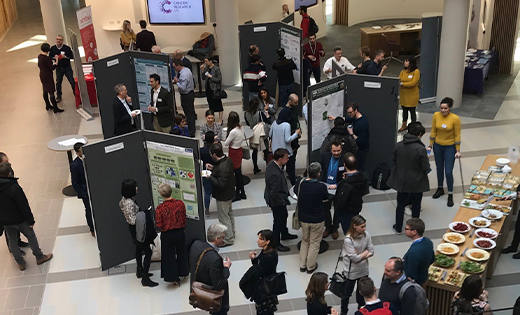 Cancer Research UK roadshow in full swing in Nexus' atrium
Cancer Research UK roadshow in full swing in Nexus' atrium
Cancer Research UK Roadshow
A senior team from Cancer Research UK (CRUK) visited campus this month, as part of World Cancer Day 2020.
The event provided opportunities to better understand CRUK funding and partnership opportunities available to researchers.
CRUK staff delivered a range of presentations from its Therapeutic Discovery, AstraZeneca Antibody Alliance and AstraZeneca Functional Genomics Laboratories; Commercial Partnerships and Ximbio.
Dr Chris Jones, an early career researcher, and University Academic Fellow, Dr Lucy Stead, presented their research into oesophageal and brain cancers. Professors Richard Bayliss and Andy Wilson, from the Astbury Centre, gave talks on Structural Biology and Chemistry, and our expertise in Intelligent Technologies was highlighted by Professors David Hogg and Pietro Valdastri.
John Ladbury, Professor of Mechanistic Biology, said: “The visit provided the University with a chance to showcase our high quality, diverse portfolio of cancer research.
“Through the resource that the University provides our cancer scientists, we have been able to take cancer research into new and exciting areas. We have great strength in this area and through working closely with major funders, such as CRUK, we will get stronger.”
BBC Look North reported on the Roadshow and interviewed David Sebag-Montefiore, Professor of Clinical Oncology, who said: “We are very pleased that Cancer Research UK has funded CONCORDE – a ground-breaking clinical trial led by Leeds researchers and Leeds Clinical Trial Unit.
“CONCORDE combines DNA damage response inhibitors with radiotherapy to try and improve the curative treatment of lung cancer. It delivers a ‘team science’ approach taking high quality pre-clinical research into the clinic.”
 The need to decarbonise the steel industry is becoming more and more apparent
The need to decarbonise the steel industry is becoming more and more apparent
Helping a heavy industry reach net-zero
Scientists have secured funding to investigate ways the UK steel industry can be decarbonised within 30 years.
Steel manufacturing is a high carbon process. According to figures from the World Steel Association, every tonne that is manufactured creates 1.8 tonnes of carbon dioxide – a key gas responsible for climate change.
With the UK legally committed to be a net-zero emitter of greenhouse gases by 2050, the industry faces an uncertain future unless it ends its dependence on carbon.
An interdisciplinary team from Leeds and Sheffield has won £1.26 million from the Centre for Research into Energy Demand Solutions (CREDS), funded by UKRI, to develop approaches that blend technology and policy with the aim of eliminating the industry’s dependence on fossil fuels.
Professor William Gale, from the School of Process and Chemical Engineering at Leeds and the project’s principal investigator, said: “The reality is the steel industry in the UK has to decarbonise, but this has to be done sensitively otherwise there is a risk the industry will relocate to where the rules on carbon are more lax.
“Our challenge is to bring about real change without eroding the wafer-thin margins on which the industry operates.”
Data workshop
Leeds Institute for Teaching Excellence (LITE) is hosting a workshop looking at various types of quantitative data and the approaches to analysing these.
The event, from 2-3.30pm on Monday 16 March, will explore questions including:
- When is it necessary to apply a statistical test to quantitative data?
- What tests are appropriate for different types of data?; and
- How can statistics help us to understand the validity of our finding?
The workshop will attempt to answer these questions without turning participants into expert statisticians.
This workshop is for colleagues who have gathered, or are gathering, quantitative data and who want to better understand how to handle it beyond the most basic levels of analysis.
The focus will be on pedagogic research exploring approaches and themes within learning and teaching and the higher education environment.
How to feature in future round-ups
Please contact Internal Communications if you or one of your colleagues would like to appear in this monthly feature.
Posted in: University news